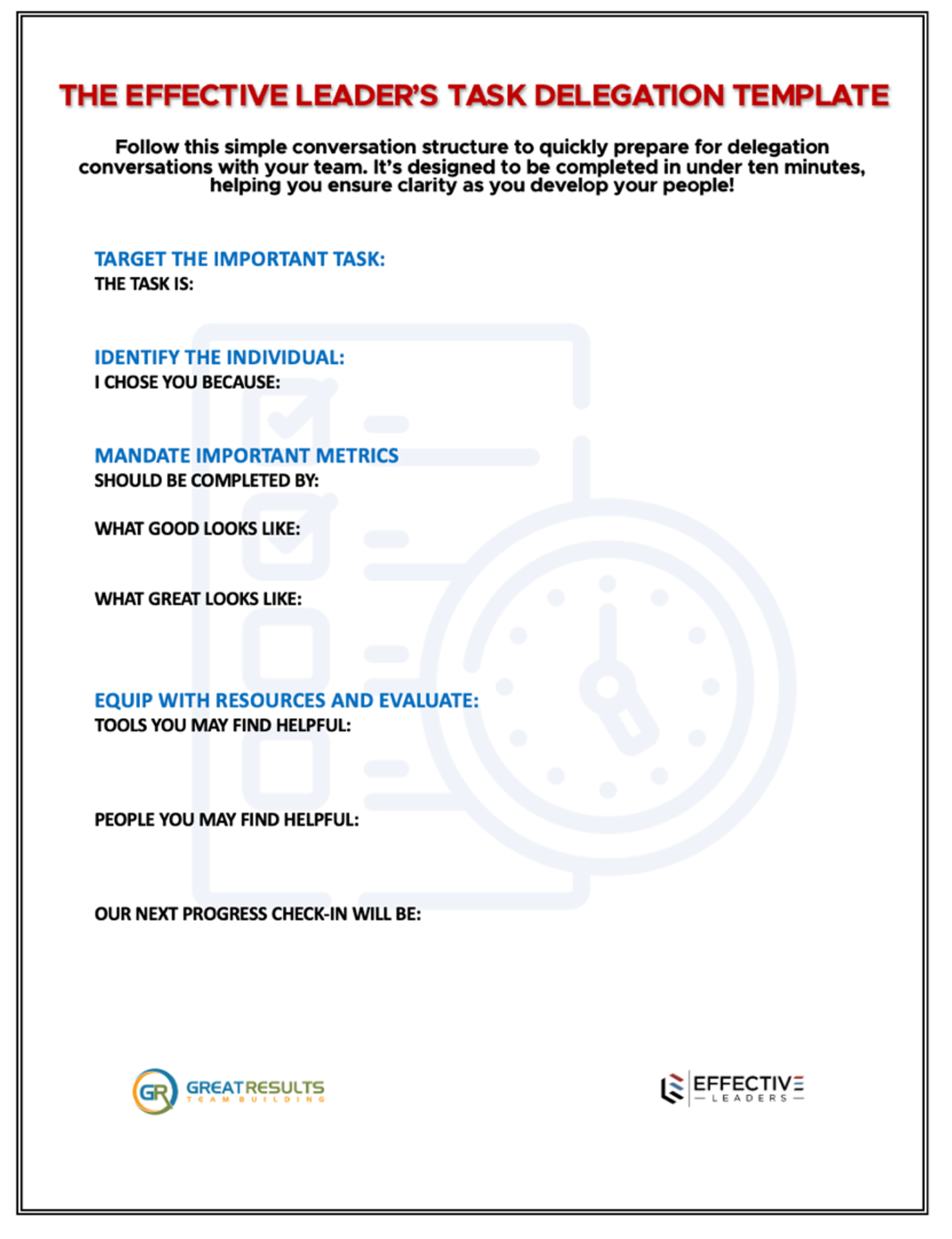Before you became a manager or team leader, success was about solving problems for people. As an effective leader, though, you solve problems through people.
Delegation is a critical skill for managers that maximizes their effectiveness and empowers their teams. Properly delegating tasks not only frees up a manager’s time for higher-level strategic work but also empowers team members, boosts morale, and fosters professional growth.
This article shares insights on how managers can delegate tasks effectively.
Understanding the Importance of Delegation
Delegation is not just about offloading work; it’s about strategically assigning tasks to team members to enhance productivity and development. CEOs who excel in delegation see a remarkable increase in revenue, highlighting its importance in driving organizational success.
Effective delegation empowers employees by recognizing their capabilities and providing them with ownership and accountability, leading to higher morale and better performance.
Overcoming Reluctance to Delegate
Managers often hesitate to delegate due to a fear of losing control, a lack of confidence in their team’s abilities, or a belief that they are indispensable. However, these barriers can lead to burnout, poor quality work, and missed deadlines.
Recognizing delegation as a sign of strong leadership rather than weakness is the first step towards overcoming these challenges.

Key Steps for Delegation That Empowers Team Members
Effective leaders understand that delegation is not like throwing a bouquet at a wedding, where you blindly hope that a task is grabbed enthusiastically by someone when you decide to let go of it…
Instead, it is like handing off a valuable baton to a runner who you know is ready to take ownership of the task and get it to the finish line with your encouragement.
Leaders usually delegate when they are drowning and desperate- so they do a poor job of rushing through the handoff and providing information about time and quality expectations.
Don’t dump and disappear…
Take 15 minutes each week as time to proactively identify tasks 2-3 weeks out that you can successfully explain and then evaluate before it is required…
You develop people by encouraging them to do what is uncomfortable or new, then coaching them to improve to a point that they are competent
T.I.M.E. FOR DELEGATION:

-
Target Appropriate Task for Delegation
Not all of your responsibilities are suitable for delegation. Managers should ask themselves the following questions to determine which tasks to delegate:
- Is there someone else who can complete the task successfully?
- Does the task provide an opportunity for someone to develop new skills?
- Is this a recurring task that will happen again?
- Is there enough time to delegate the job effectively?
- Is the task critical for the manager to handle personally?
Tasks that are routine, time-consuming, and not part of the manager’s core responsibilities are prime candidates for delegation.
-
Identify the Right Individual

Selecting the right person for the task is crucial. Consider the individual’s experience, knowledge, skills, and current workload. Match the amount of responsibility with the appropriate level of authority while maintaining ultimate accountability yourself.
Ensure the chosen employee has or can be given the necessary training and resources to succeed.
-
Mandate Important Metrics
Clarity is key in delegation. Clearly define the desired outcomes, including specific objectives about tim and quality. Explain why the task is being delegated and what is expected from the employee. Outline timelines and available resources to ensure there is no ambiguity.
Explain the differences between what poor, good, and great look like to you!
Empower the employee by giving them the autonomy to complete tasks in their own way. This fosters creativity and innovation, as team members may come up with new approaches and solutions.
-
Equip with Resources and Evaluate Progress
Support and helpful tools should be readily available. Maintain open lines of communication for questions and feedback, and check in periodically to monitor progress without micromanaging. Regularly review the progress of delegated tasks.
Set milestones to ensure the project stays on track and provide constructive feedback to help employees improve. Recognize and reward successful completion of tasks to build confidence and reinforce positive behavior.
Use this TASK DELEGATION TEMPLATE to prepare for your conversations:
.
The Benefits of Effective Delegation
When done well, delegation offers numerous benefits:
- Properly aligned tasks with employees’ skills boost overall productivity.
- Empowers team members with greater job satisfaction and motivation.
- Delegation encourages a culture of innovation and collaboration
- Team members develop new skills to advance their careers.
Avoiding Delegation Problems and Pitfalls
To avoid common pitfalls, managers should balance oversight with autonomy.
Avoid micromanaging, but also steer clear of abdicating control entirely. Ensure that delegated tasks are aligned with employees’ career paths and consider how these tasks can enhance their engagement and commitment.

Effective delegation is a powerful tool for managers to grow their team.
Leadership development training workshops and team building activities are useful investments to help improve team performance – but delegation may be the most important activity you can focus on to truly build your team members confidence.
By strategically assigning tasks, providing clear instructions, empowering team members, and offering support, managers can free up their time for higher-priority work while fostering a productive and motivated team.
The result is a win-win situation where both the manager and the team members grow and thrive, leading to overall organizational success.
Managers who master the art of delegation not only enhance their own productivity but also build a stronger, more capable team ready to take on new challenges and drive the organization forward.
– – – – –
Sean Glaze is a leadership speaker, teambuilding facilitator, and author who delivers engaging experiences that ignite your team’s performance. Sean has worked with clients like Cisco, John Deere, the CDC, and Emory University to increase collaboration, boost productivity, and build more positive and profitable workplace cultures.
experiences that ignite your team’s performance. Sean has worked with clients like Cisco, John Deere, the CDC, and Emory University to increase collaboration, boost productivity, and build more positive and profitable workplace cultures.
As a successful basketball coach, Sean gained valuable insights on turning talent into teamwork – and now he travels around the country to share those lessons. Sean’s conference keynotes and custom team building events deliver laugh-out-loud moments and memorable take-aways that transform your people into winning teammates and more effective leaders.
Sean’s books, Rapid Teamwork, The 10 Commandments of Winning Teammates, and Staying Coachable are entertaining parables that help accelerate the growth of leaders and their teams!



